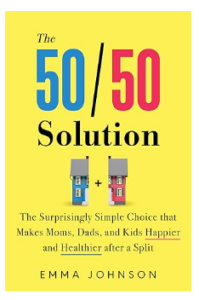Hi Folks! I wrote this piece for my syndicated column, but am posting it here because it gets at one of the core beliefs not just tearing divorced families further apart, but driving many parents mad with guilt and worry: The idea that kids need a mega-dose of mom to grow up healthy. As we discuss here (endlessly), secure parent/child attachment is good! But so is trusting that kids will end up decently well-attached without constant, intensive adult supervision! So here’s my column on…
“Relationships don’t last anymore,” observed comedian Rita Rudner. “When I meet a guy, the first question I ask myself is, ‘Is this the man I want my children to spend their weekends with?’”
Great joke – horrible reality. But a new solution is on the horizon. After years of research, writer/activist Emma Johnson has come up with the best answer to the question of which parent should get majority custody of the kids after a divorce. You can guess it from the title of her new book: “The 50/50 Solution: The Surprisingly Simple Choice that Makes Moms, Dads, and Kids Happier and Healthier after a Split.”
“Whether they live in separate homes by divorce, separation, or maybe they were never together in a relationship to begin with, a 50/50 schedule is what is going to be best for the children’s outcomes,” says Johnson, the Solomon of divorce. But it’s also “best for the moms, in terms of their income-earning ability and well-being. And it’s really what’s best for dads and men.”
“I bought into it myself.”
Johnson has spent more than a decade running the wildly popular WealthySingleMommy blog, advising moms struggling with money, childcare, and dating issues. Part of the problem, she quickly realized, is that the culture has come to believe it’s a no-brainer that divorced moms should get majority custody of the kids.
But there’s really no real reason for that assumption, says Johnson, a divorced mom herself. That model was based on “these old, dated ideas about attachment — the idea that more time with mom, with one single caregiver [is best]. I bought into that idea myself,” she admits.
In fact, bonding with both parents is better, because when the dad is truly a co-parent, he is far more likely to stay in the children’s lives. “And father-absence is a huge, huge risk factor for kids that plays out throughout their lives,” Johnson says.
The weekends-only model “signals to the dad that he doesn’t matter because he’s got the kids 30% of the time,” says Johnson. It signals this to the kids, too.
Day-to-day parenting.
Relegated to second-tier status, and absent from day-to-day family life, dads are more likely to drift away. Bonding comes from dealing with “the good and the bad. Getting your 4-year-old to get their shoes on and out the door. You fight about bath time and you get to have that snuggle bedtime story,” Johnson says. Without that whole spectrum, dads “don’t develop as parents.”
The weekends-only arrangement is stunting them.
What happens when the arrangement is 50/50? Johnson points to Kentucky, an early adopter of the equal parenting law. After it passed, she says, domestic violence filings went down. So did child abuse.
In Ohio, where some districts have adopted the 50/50 law and others haven’t, her research found the same thing: In the 50/50 pockets, “substantiated child abuse charges were lower.”
New laws on the horizon.
Right now there are dozens of bills throughout the U.S. that would make equal parenting schedules the default. Who is against them? Sometimes divorce lawyers, Johnson believes. After all, they do best when parents keep fighting. She also blames the old-school notion that, in a divorce, it is the dad’s job to give their exes’ space and money, period.
But in truth: only 40% of child support ever gets paid. And for struggling families, that support can amount to just a couple hundred dollars a month, Johnson says. In which case, having childcare half the week would allow moms to make more than that.
“Historically,” Johnson says, “divorce was a fight and how do you win? You take his money and you take his kids and then you win.” But with a 50/50 law, “You take the fight out of it.” You keep both parents in, which keeps the divorced family, in its own way, intact.



